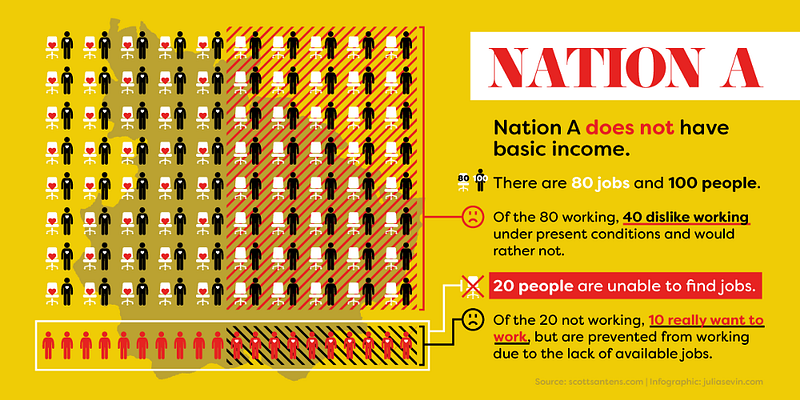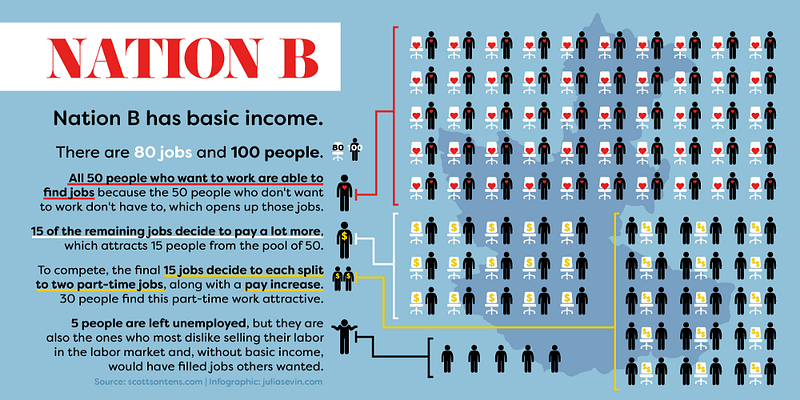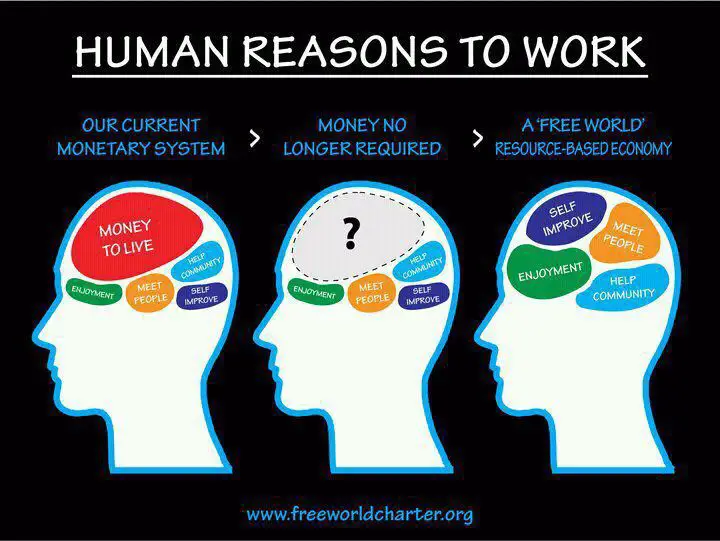
Wiki / Geldwirtschaft
Inhaltsverzeichnis: (verbergen)
 |
|
Würden die Menschen das Geldsystem verstehen, hätten wir noch vor |
Die Zinswirtschaft des Geldes und der persönliche Besitz an Grund und Boden sind problematisch, da sie zur Folge haben, dass die Gruppe der Grund- und Kapitalbesitzer ihren finanziellen Reichtum immer mehr vergrößern, ohne eine Leistung zu erbringen, während jene, die weder Kapital noch Immobilien besitzen, mit jeder finanziellen Transaktion einen Anteil an Zins bezahlen, der den Besitzenden zugutekommt.
Diese Mechanismen wurden schon früh erkannt; so findet sich eines der ersten überlieferten Zinsverbote überhaupt in der Bibel, unter anderem in 5. Mose 23, 20 ff:
Zu biblischen Zeiten galt das Zinsverbot nur für die "Volksgenossen", und es gab keine so bedeutenden Wirtschaften wie heute, so dass die schädlichen Wirkungen des Zinses in Grenzen gehalten wurden, wenn er gegenüber Fremden verlangt wurde. In der heutigen globalisierten Welt ist es sinnvoll, alle anderen Menschen als "Volksgenossen" zu definieren und den Zins vollständig abzuschaffen, womit eine große Quelle der Ungerechtigkeit aus der Welt entfernt würde.
Ebenfalls finden sich in der Bibel schon Beschränkungen für Grundbesitz in 3. Mose 25, 23 ff:
Grund und Boden darf nicht für immer verkauft werden, denn das Land ist Gottes, und die Menschen sind Fremdlinge und Beisassen auf ihr.
|
Im Jahr 1932 litt die österreichische Gemeinde Wörgl an einer schwierigen finanziellen Situation und hoher Arbeitslosigkeit. Darauf hin startete die Gemeinde ein vielfach beachtetes und erfolgreiches Experiment mit Freigeld nach der Lehre von Silvio Gesell, das die Wirtschaft wieder in Schwung brachte und innerhalb der Gemeinde soviel Wohlstand schuf, dass
Marx' Gesellschaftstheorie ist gescheitert, Gesells Freiwirtschaftstheorie wurde noch nicht langzeitig geprüft.
|
|
1916 formulierte Silvio Gesell (1862-1930) seine Idee einer "natürlichen Wirtschaftsordnung", die den Geldfluss sichert, indem Geld zu einer staatlichen Dienstleistung wird, für die Menschen eine Nutzungsgebühr entrichten. Statt denjenigen Zinsen zu zahlen, die mehr Geld haben, als sie benötigen, damit sie das Geld zurück in den Umlauf geben, sollen diese eine geringe Gebühr zahlen, wenn sie ihr Geld vom Umlauf zurückhalten. Diese Gebühr kommt nicht Einzelnen zugute, sondern den aktiv am Marktgeschehen Beteiligten, die miteinander Austausch betreiben und die Akzeptanz des Zahlungsmittels ge-
währleisten.
Um diesen Gedanken besser zu verstehen, ist es hilfreich, das Geld mit einem Eisenbahnwaggon zu vergleichen, der ebenso wie Geld den Austausch von Gütern erleichtert. Natürlich zahlt niemand demjenigen, der einen Waggon benutzt, eine Prämie (= Zins), damit er ihn entlädt, um ihn zurück in den Umlauf zu bringen, sondern der Nutzer zahlt eine geringe Gebühr, "Stand-
geld" genannt, wenn er den Waggon nicht entlädt. Das wäre im Grundsatz alles, was wir mit dem Geld tun müssten, um den Zins und seine negativen Folgen abzuschaffen. Der jeweilige Benutzer bezahlt eine geringe "Parkgebühr" , wenn er das neue Geld länger behält, als für den Zweck des Austausches erforderlich ist.
Während heutzutage Zinsen einen privaten Gewinn darstellen, würde die Benutzungsgebühr für das Geld einen öffentlichen Gewinn darstellen. Die Gebühr müsste wiederum in den Geldkreislauf zurückgebracht werden, damit das Gleichgewicht zwi-
schen dem Geldvolumen und dem Umfang der wirtschaftlichen Aktivität bestehen bleibt. Sie würde eine öffentliche Einnah-
me-
quelle darstellen, mit der die Kosten der Notenbank und des Geldumtauschs abgedeckt werden. Überschüsse gingen – wie heute auch – in die Bundeskasse und könnten für Schuldentilgungen zweckgebunden werden. Diese Änderung – so einfach sie auch scheinen mag – ist eine Lösung für die vielen Probleme, die durch den Zins und Zinseszins in der Vergangenheit
und Gegenwart hervorgerufen wurden.
Silvio Gesell nannte diese Form von Geld "Freigeld", weil es zinsfrei war.
Dieter Suhr hat dafür den Begriff "Neutrales Geld" geprägt, weil es allen dient und keinem einseitige Vorteile einräumt wie
das heutige Geldsystem. Dieser Bezeichnung schließe ich mich an. Wenn ich über zinsfreie Tauschmittel spreche, die einer Nutzungsgebühr unterliegen, verwende ich den Begriff Neutrales Geld.
| Literatur: Prof. Dr. Margrit Kennedy (1939-2013) deutsche Architektin, Ökologin, Kapitalismus-Kritikerin, Freiwirtschafts-Befürworterin, Schriftstellerin, Geld ohne Zinsen und Inflation. Ein Tauschmittel, das jedem dient, Wilhelm Goldmann Verlag, München, bearbeitete und ergänzte 1. Auflage 1. September 1991, 1994 Weiterverbreitung ist ausdrücklich erwünscht. |
| |||||||||||||||||||||||||||||||||||||||||||||||||||||||||||||||||||||||||||||||||
| Sources featuring Frederic Laloux, Belgian US American facilitator with corporate leaders, adviser, coach, visionary author ► Book: Reinventing Organizations. A Guide to Creating Organizations Inspired by the Next Stage in Human Consciousness, Nelson Parker, 20. February 2014 ► Article: Reinventing Organizations: 3 Breakthroughs to Make Organizations More Integral. Frederic Laloux and Ken Wilber, 10. February 2014 |
| Quelle: ► Gelöschter Artikel: Frederic Laloux, belgisch-US-amerikanischer Unternehmensberater, Coach, visionärer Autor, Die Neuerfindung von Organisationen [Reinventing Organisations]. Ken Wilber im Gespräch mit Frederic Laloux, präsentiert von der deutschen online-Zeitschrift Integrales Forum, integral informiert, zusammengefasst von Michael Habecker, Seite 7, Nr. 47, Mai/Juni 2014 |
Persönliche Bekenntnisse
Schlussfolgerung
Alternativartikel dm-Gründer fordert 1.000 Euro monatlich für jeden – seine Begründung ist verdammt gut, präsentiert von der online Wirtschaftszeitung Business Insider Deutschland, 7. Januar 2018
Das unantastbare Lebensgeld (ULG) – Carsten Rachow
Future prospect

Definition of wealth



Frederic Laloux, Belgian US American facilitator with corporate leaders, adviser, coach, visionary author, Reinventing Organizations. A Guide to Creating Organizations Inspired by the Next Stage in Human Consciousness, Nelson Parker, 20. February 2014
SELF-MANAGEMENT ❄ Trust
Planning the future ❄ decision-making
Information ❄ transparency ❄ decision-making
Responsibility ❄ accountability
Safe and caring workplace
Overcoming separateness
Humane relationships
PURPOSE ❄ Collective purpose
Individual purpose
Taming the fears of the ego
Embracing complexity wisely
Spiral dynamics – Pathology of First Tier evolution
Spiral dynamics – Unfolding the second tier evolution
Leadership in the Teal domain
Ken Wilber's framework on shaping organisations
Related cited quotes
| |||||||||||||||||||||||||||||||||||
| Source: ► Video keynote lecture by Bernard Lietaer, Ph.D. (1942-2019) Belgian economist, co-designer of the European € currency, Central Bank of Belgium, professor of International Finance, University, Louvain, Belgium, research fellow at the "Center for Sustainable Resources", UCB, co-founder of the ACCESS Foundation, author, website Transaction.net/money, location Interface Conference (focussing on the role of media in the financial crisis), Covering the Crisis, Brussels, 9.-10. November 2009, sponsored by the European Journalism Centre (EJC), YouTube film, posted 13. November 2009 ☛ The New Paradigm of Money, part 1 of 5, 9:58 minutes duration ☛ The New Paradigm of Money, part 2 of 5, 9:57 minutes duration ☛ The New Paradigm of Money, part 3 of 5, 9:57 minutes duration ☛ The New Paradigm of Money, part 4 of 5, 5:20 minutes duration ☛ The New Paradigm of Money, part 5 of 5, 5:24 minutes duration ☛ Q&A section: The New Paradigm of Money, part 1 of 2, 9:57 minutes duration ☛ Q&A section: The New Paradigm of Money, part 2 of 2, 8:12 minutes duration |
| See also: ► Gender research |
|
| Written reference: ► Article Switzerland’s Proposal to Pay People for Being Alive, page 2 of 2, presented by the US American daily newspaper The New York Times, Annie Lowrey, 12. November 2013 |
| Video references: ► Vimeo video presentation by Evelyn Forget, Ph.D., Canadian health economist, faculty of medicine, University of Manitoba, The Promise that Guaranteed Livable Income hold for Women's Freedom, part 1, sponsored by Vancouver Rape Relief and Women's Shelter, presented by Vancouver Public Library, Vancouver, BC, 1. December 2012, 22:17 minute duration, posted February 2013 ► Video presentation Basic Income, a new human right, presented by the initiative basicincome2013, YouTube film, 3:07 minutes duration, posted 28. March 2013 |
|
| Source: ► Article Ten Reasons to Support Basic Income, presented by Basic Income UK, undated |
Links zum Thema Alternative Geldmodelle / Alternative monetary economy and money modelsLiteratur
Ökoeffektivität / Cradle-to-cradle-Konzept Nachhaltige Entwicklung
Literature (engl.)
Externe Weblinks
Weblinks zum Thema Geldwirtschaft – QuoraBeiträge verfasst von Elfriede Ammann, präsentiert auf der kalifornischen Frage-und-Antwort Webseite Quora DE
External web links (engl.)
Utrecht takes step towards paying people a salary whether they work or not.
Audio- und Videolinks
Audio- und Videolinks – Bernd Senf
Zinsloses Geld und staatliche Geldschöpfung, 100%-Geld, Vollgeld, Umlaufsicherungsgebühr, Brakteaten, Regionalwährungen – Tobin-Steuer, Firewall, Neues Bretton Woods?
Audio and video links (engl.)
Hitler's Nazi Germany and communism alike were financed by the invisible government (globalists).
Up until 2008 Martinez has helped to eliminate $700 million in credit card debt for those not feint of heart.
|
Englisch Wiki
Hawkins